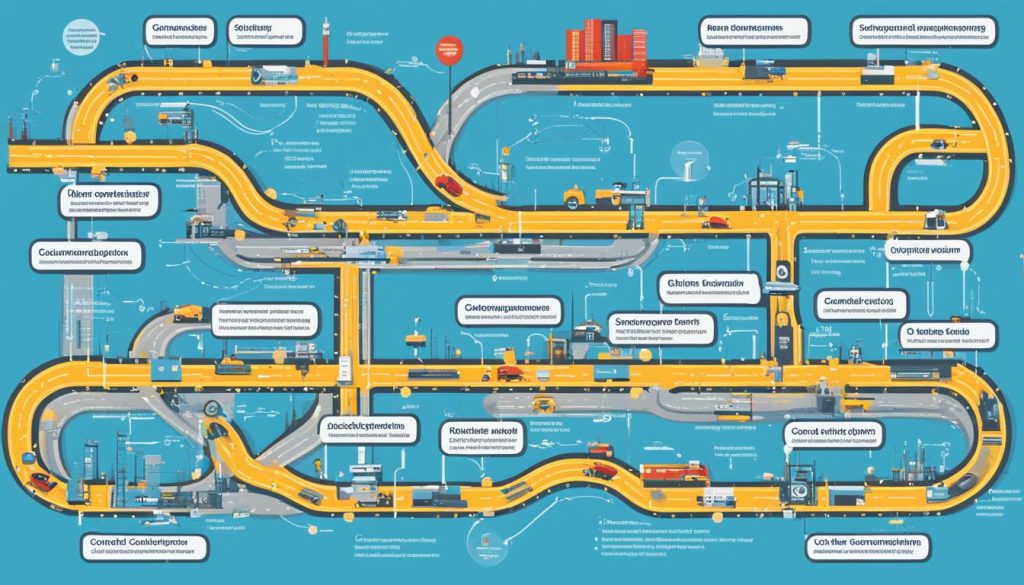As you contemplate a future within the manufacturing sector, it’s vital to recognize that the landscape is continuously transforming, mandating a robust foundation of skills and knowledge. Embarking on pathways to manufacturing careers opens up a world where innovation meets practical application, and specialized training is not just beneficial but necessary. Your journey towards a lucrative career in manufacturing can commence with an array of educational routes, tailored to meet the indispensability of advanced manufacturing education.
Whether you’re just starting out or looking to pivot into a more dynamic role, understanding the myriad educational options is crucial. From hands-on training to academic degrees, the choices are diverse and designed to propel you into a field that’s not only foundational to our economy but also at the forefront of technological evolution. In this segment, we’ll explore the variety of educational avenues that can lead you to a successful and fulfilling career in manufacturing.
Key Takeaways
- Discover the evolving nature of manufacturing and the corresponding educational requirements.
- Learn about the diverse pathways to manufacturing careers, from vocational training to advanced degrees.
- Understand the critical role of advanced manufacturing education in fostering a successful career.
- Explore current industry needs and how to align your education accordingly.
- Realize the significance of staying abreast of technology and innovation within the manufacturing sector.
Understanding the Manufacturing Industry Landscape
The manufacturing sector is a cornerstone of economic development, providing a broad array of job opportunities and driving innovation. As you consider a career in this diverse field, it’s important to comprehend the various facets of the industry and how technological changes have revolutionized production processes, career paths, and skill requirements.
Key Manufacturing Sectors and Job Opportunities
From automotive to aerospace, the manufacturing industry spans several critical sectors. Each sector not only fuels advancements in everyday living but also offers unique career paths catering to various interests and skill sets. Opportunities range from quality assurance to operations management, and with targeted manufacturing career training, securing a position in these fields becomes a tangible goal.
Technological Advancements Impacting Manufacturing Careers
Innovation has always been at the heart of manufacturing, with recent breakthroughs in automation, AI, and the IoT paving the way for a new era of production. These technological advancements are not just transforming the shop floor; they’re also shaping the nature of manufacturing careers, demanding a blend of traditional skills and digital fluency.
The Importance of Skilled Labor in Modern Manufacturing
The manufacturing landscape is witnessing a surge in demand for skilled labor capable of bridging the gap between old-world craftsmanship and new-age technology. Acquiring manufacturing industry certifications can be a game-changer for your career, certifying your expertise and commitment to industry standards of excellence.
| Sector | Job Roles | Required Skills | Certifications |
|---|---|---|---|
| Aerospace | Systems Engineer, Assembler | Precision Engineering, Systems Integration | A&P Certification |
| Automotive | Process Engineer, Quality Control Analyst | Automotive Systems, Quality Assurance | ASE Certification |
| Consumer Goods | Product Developer, Supply Chain Analyst | Product Design, Logistics Management | Six Sigma Green Belt |
| Electronics | Electronics Technician, SMT Operator | Circuit Analysis, Soldering | IPC Certification |
| Energy | Operations Manager, Compliance Officer | Project Management, Regulatory Knowledge | PMP Certification, OSHA Training |
Charting Your Course: Manufacturing Education Programs
When deciding on the right path to forging a successful career in the manufacturing industry, manufacturing degree options offer a structured route that aligns with specific career aspirations and industry demands. Understanding the landscape of manufacturing education programs is crucial to making informed decisions that will fuel your professional growth.

Manufacturing degree programs vary widely, from hands-on technical courses to advanced academic degrees. These programs are designed to prepare you not only with the technical know-how but also with the problem-solving and management skills required in today’s manufacturing environment. Below is a comprehensive table that details common manufacturing education programs, their duration, and the opportunities they can open up for you.
| Program Type | Duration | Skills Acquired | Potential Career Outcomes |
|---|---|---|---|
| Technical Certificate | 6-12 months | Machine operation, basic production, safety protocols | Machine Operator, Production Technician |
| Associate’s Degree | 2 years | Advanced technical skills, team leadership, quality assurance | Supervisor, Quality Control Inspector |
| Bachelor’s Degree | 4 years | Engineering principles, design methodologies, project management | Manufacturing Engineer, Process Developer |
| Master’s Degree | 1-2 years post-bachelor’s | Specialized technical expertise, strategic planning, advanced research skills | Industrial Manager, Senior Consultant |
It’s critical to consider that while technical programs offer swift entry into the manufacturing arena, longer-term degree options can pave the way for higher-level positions and long-term career growth. Assess your personal interests, the time you can invest in education, and your long-term career goals when choosing between the various manufacturing degree options.
Beyond the classroom, real-world experience gained through internships or cooperative education can provide a significant edge in the competitive job market. Therefore, when selecting a program, consider the practical training components that can bridge the gap between theoretical knowledge and hands-on expertise.
Your education in manufacturing is an investment in your future. Ensure that the program you choose not only aligns with your career objectives but also provides a robust foundation for lifelong learning and adaptability in the face of an ever-evolving industry.
Educational Pathways into Manufacturing
Progressing towards a lucrative career in manufacturing begins by choosing the right educational pathway. Whether you’re entering the workforce for the first time or seeking to upgrade your skills, a range of educational options tailored for manufacturing jobs awaits you. Understanding each of these pathways is critical in developing your skills and advancing your career in this innovative sector.
Certificates and Associates Degrees as Stepping Stones
If you’re aiming to quickly dive into the manufacturing field, vocational training and certificate programs provide practical, skill-oriented education that can be completed in a relatively short period. Associate degrees, on the other hand, offer a more in-depth understanding of manufacturing processes, preparing you for technician-level roles. Both pathways are designed to get you workforce-ready and provide an essential foundation for any future educational endeavors.
Bachelor’s and Master’s Degree Options in Manufacturing
For those looking to attain leadership roles and specialize in areas such as supply chain management or engineering, pursuing a bachelor’s or master’s degree in manufacturing can open doors to advanced opportunities. These comprehensive degrees often include elements of business, technology, and project management, aligning your skills with the evolving needs of the industry and preparing you for high-level decision-making roles.
Continuing Education and Lifelong Learning in Manufacturing
The manufacturing industry is continually shaped by technological advancements and global market shifts, necessitating a commitment to ongoing learning. Continuing education courses, professional workshops, and seminars offer avenues for you to stay up-to-date with the latest innovations in manufacturing. Embracing lifelong learning is not just advantageous; it’s essential for maintaining the competitive edge in your career.
“In today’s manufacturing environment, upskilling and reskilling are not options but necessities. Lifelong learning is key to adaptability and growth.” – Reflects the modern mantra of advanced manufacturing education.
By recognizing the value and diversity of vocational training for manufacturing jobs, you can establish a robust foundation that supports your growth within the industry. Advanced manufacturing education plays a pivotal role in your ability to adapt and excel in this dynamic field. Whether starting with a certificate or climbing the educational ladder all the way to a master’s degree, each step you take is an investment in your future within the world of manufacturing.
Hands-On Training: Vocational Training for Manufacturing Jobs
As the manufacturing landscape grows increasingly complex, the demand for skilled professionals with practical experience has never been higher. Manufacturing education programs with a hands-on, vocational training focus are key to cultivating the expertise required for today’s competitive job market. These programs are designed to provide you with tangible skills that will empower you to excel in the manufacturing industry.
Vocational training goes beyond theoretical knowledge, emphasizing real-world application and technical proficiency. Through a blend of classroom instruction and practical exercises, you’ll learn how to operate cutting-edge machinery, manage workflow processes, and adhere to industry safety standards, all of which are vital for a successful career in manufacturing.

- Technical skills development in areas such as CNC machining, welding, and automation
- Hands-on experience through lab work and on-site training
- Apprenticeship opportunities for immersive learning
- Insight into quality control measures and lean manufacturing practices
| Program Type | Duration | Skills Acquired | Career Pathway |
|---|---|---|---|
| Certificate in CNC Operations | 6 Months | Machine setup, programming, and operation | Machine Operator |
| Diploma in Manufacturing Technology | 1-2 Years | Advanced manufacturing technologies, production processes | Production Technician |
| Associate Degree in Applied Science | 2 Years | Engineering principles, materials science, project management | Manufacturing Engineer Technician |
Remember, choosing the right manufacturing education program is crucial. Align your vocational training with your career aspirations and industry demand. With the practical skills you gain, you’ll be well-equipped to tackle challenges on the manufacturing floor and advance rapidly within this dynamic field. Forge your path in the manufacturing sector with the confidence that comes from hands-on vocational training.
Conclusion
In weaving together the wealth of information presented, it’s evident the manufacturing sector affords a plethora of educational pathways and career training opportunities. As you stand at the crossroads of your vocational journey, it’s crucial to select a route that not only aligns with your aspirations but also equips you with the requisite skills to thrive in an industry marked by continuous evolution and technological innovation. We have charted the terrain—from certificates to advanced degrees and underscored the imperative of hands-on experience through vocational training.
Navigating Your Manufacturing Education Journey
Embarking on a journey towards a successful manufacturing career requires more than just academic prowess; it necessitates a strategic approach to education. By integrating knowledge from practical experiences and formal manufacturing education programs, you cultivate a comprehensive skill set that sets the foundation for your career. Whether you’re exploring vocational training or considering manufacturing degrees, each step you take is a valuable investment in your future. Prioritize learning pathways that offer not just credentials but also real-world applicability.
The Value of Networking and Professional Certification
As you delve deeper into the world of manufacturing, you’ll discover that beyond the acquired technical know-how, manufacturing industry certifications and a robust professional network are invaluable assets. These certifications serve as a testament to your expertise and dedication to continuous improvement in your field. Meanwhile, a strong network provides support, opens doors to new opportunities, and keeps you abreast of industry trends. Remember, it’s not just what you know, but who you know that can elevate your career trajectory in manufacturing.
Future Proofing Your Manufacturing Career
Finally, to secure your position in the dynamic landscape of manufacturing, it’s imperative to adopt a mindset of lifelong learning. Embrace advancements in technology, remain adaptable to shifts in the industry, and seize opportunities for manufacturing career training relentlessly. By staying ahead of the curve and adapting your skills to the changing needs of the industry, you safeguard your career against the tides of technological change and marketplace transitions, ensuring that your role in manufacturing remains both resilient and rewarding.
FAQ
What are some educational pathways into manufacturing careers?
Educational pathways to manufacturing careers include technical certificates, associate’s degrees, technical or vocational training programs, apprenticeships, as well as bachelor’s and master’s degrees in engineering or manufacturing-related fields. Advanced manufacturing education can also be pursued through specialized programs focusing on areas such as automation, robotics, and the Internet of Things (IoT).
What impact do technological advancements have on manufacturing careers?
Technological advancements, such as automation, additive manufacturing (3D printing), and the IoT, are transforming the industry, leading to the creation of new job opportunities and demanding a skilled workforce knowledgeable in modern technologies and techniques. Staying current with these advancements is crucial for career longevity and advancement in the field of manufacturing.
Why is skilled labor important in modern manufacturing?
Skilled labor is critical to modern manufacturing due to the increased complexity and specialization of manufacturing processes. Workers with the right technical skills and training ensure that operations are efficient, products are of high quality, and that innovative solutions can be implemented to keep pace with industry advancements.
What types of manufacturing degree options and education programs are available?
Prospective students can choose from a variety of manufacturing degree options such as associate’s degrees in manufacturing technology, bachelor’s degrees in manufacturing engineering or industrial technology, and master’s degrees for advanced specialized roles. Manufacturing education programs may also include certificates in precision manufacturing, CAD/CAM, or quality control to name a few.
What is the significance of manufacturing industry certifications?
Manufacturing industry certifications signify proficiency and expertise in a particular area of manufacturing. They can enhance job prospects and career advancement, as well as demonstrate to employers a commitment to the industry and a rigorous understanding of the necessary skills and safety protocols.
How do certificates and associate’s degrees serve as stepping stones in the manufacturing industry?
Certificates and associate’s degrees can provide foundational knowledge and practical skills in a shorter time frame compared to bachelor’s degrees. They allow individuals to quickly enter the workforce, gain experience, and potentially further their education while working. Such credentials are valuable for hands-on positions and can be a launchpad for more advanced roles.
What are the benefits of continuing education and lifelong learning in manufacturing?
Continuing education and lifelong learning in manufacturing help professionals stay competitive, keep up with industry changes, and adapt to new technologies and practices. This can take the form of workshops, online courses, professional development, and advanced degrees, all contributing to career growth and flexibility.
How does vocational training prepare individuals for manufacturing jobs?
Vocational training provides hands-on experience and skill-building that is directly applicable to manufacturing jobs. Through practical exercises, apprenticeships, and labs, students learn the ins and outs of machinery, tools, and processes, making them job-ready upon completion of the program.
What strategies can help future-proof a career in manufacturing?
Strategies to future-proof a career in manufacturing include continually updating skills through education and training, obtaining industry certifications, staying informed about technological trends, networking with industry professionals, and remaining adaptable to change within the sector.







